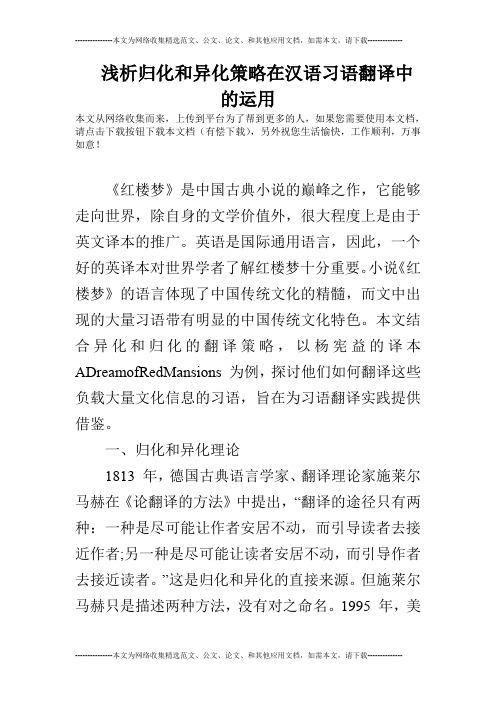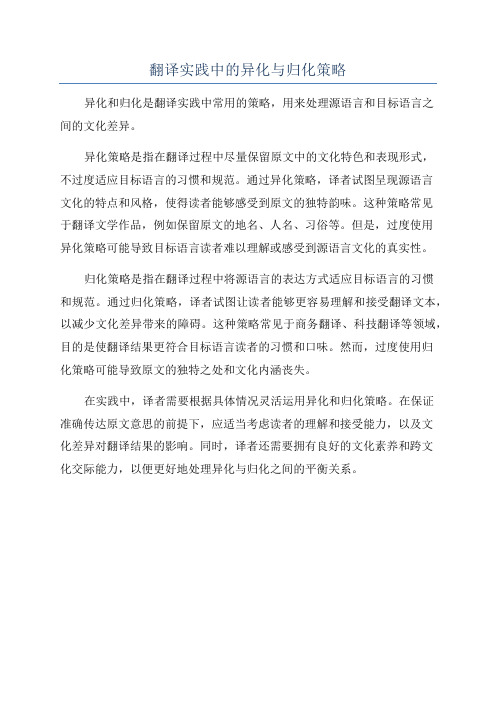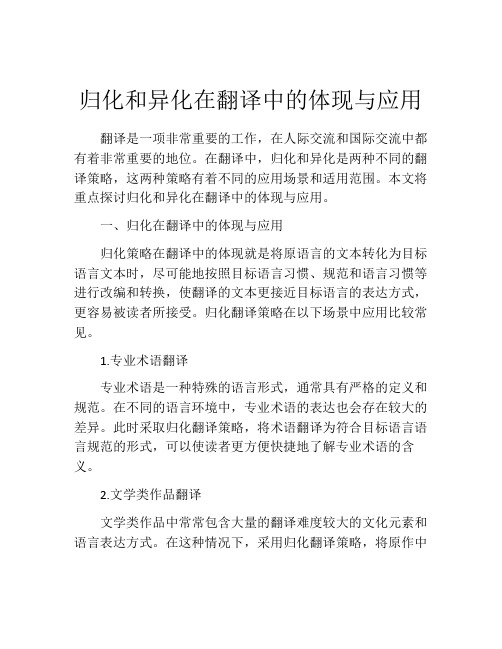异化技巧在翻译中的运用
翻译实践中的异化与归化策略

2023-11-15
目 录
• 翻译实践中的异化策略 • 翻译实践中的归化策略 • 异化与归化策略的对比分析 • 异化与归化策略在翻译实践中的应用案例 • 总结与展望
01
翻译实践中的异化策略
异化策略的定义与特点
异化策略定义
异化策略是指翻译过程中,以源语言的文化背景、语言特点、表达方式等为导 向,尽量保持原文的异国情调。
04
异化与归化策略在翻译实践中的 应用案例
异化策略应用案例:诗歌翻译
01
保持原诗的意象与语言风格
在诗歌翻译中,异化策略通常用于保持原诗的意象、比喻和语言风格,
以尽可能地传达原诗的审美和文化特点。
02
注重原文的语言表达
异化策略强调对原文的语言表达给予高度重视,包括修辞、音韵和句式
等方面,以保持原诗的独特性和艺术性。
局限性
归化策略可能会牺牲源语言的文化和语言特色,导致原文的意境和风格无法得到完全的传达。此外,过度使用归 化策略可能会导致翻译的生硬和不自然,影响读者的阅读体验。
03
异化与归化策略的对比分析
语言文化层面的对比
总结词
异化策略更强调源语言的文化特色,归化策略更注重目标语言的文化习惯。
详细描述
在翻译过程中,异化策略倾向于保留原文的语言和文化特色,包括语法、表达方式、意象等,给读者 呈现原汁原味的源语言文化。而归化策略则更注重将原文的语言和文化特色转化为目标语言的文化习 惯,让读者更容易理解和接受。
读者反应层面的对比
总结词
异化策略更容易给读者带来陌生感和疏离感 ,归化策略更能够拉近与读者的距离。
详细描述
由于异化策略强调保留原文的语言和文化特 色,对于目标语言的读者来说,可能会感到 陌生和疏离。而归化策略通过将原文转化为 符合目标语言文化习惯的形式,更容易拉近 与读者的距离,让读者更好地理解和接受。
异化和归化在翻译过程中的合理运用

异 化两 种 翻译 方 法 。 两 种 截 然不 同的 翻译 途 径 。 此 无 是 因
论 采 用 哪 一 种 , 必 须 坚 持 到 底 , 可 将 两 者 混 淆 使 用 (c 都 不 Sh
l ir r h r i e e Ma c e .nDo ls 9 7:2 - 3 。 孙 致 礼 对 他 的 uga s1 9 2 5 2 8)
可 以使读 者 通过 最 熟悉 的途 径 了解 异语 文 化 中所 要 表 现
地 结 合 , 能 称 之 为 合 理 的 翻 译 。 具 体 翻 译 时 , 先 要 对 才 在 首
翻译 的 目的、 目的 语 的 语 言 习 惯 、 者 的 反 映 和 接 受 能 力 、 读
目的语 的文化 的接收 环境 等进 行 多方 位 的考 虑 。
理 解 的 , 如 英语 是 世 界上 使 用 最 为普 遍 的 语 言 , 翻 译 例 当 工 作 者 把 使 用 范 围 并 不 是 很 广 泛 的 文 学 作 品 翻 译 成 英 文 时 . 会 不 得 不 考 虑 现 实 的 客 观 问 题 , 读 者 的 反 映 、 者 就 如 读 的 接 受 能 力 , 至 于 作 品 的 出 版 问 题 , 等 。 这 样 的 情 况 甚 等 在 下 . 者 往往 会选 择 “ 牲 原 文” 翻译 策 略 , 译 文 的“ 译 牺 的 使 充
看 法 提 出 了 质 疑 .并 指 出 异 化 与 归 化 并 非 水 火 不 相 容 , 译
者 在 翻 译 的 过 程 中必 须 采 取 “ 条 腿 走 路 ” 方 针 , 于 兼 两 的 善 用异 化 与归 化两 种方 法 。我认 为 按照 辩证 法 的观 点 , 何 任
中英互译中的异化法与归化法

中英互译中的异化法与归化法一、异化与归化的含义异化:指在翻译方法上迁就外来文化的特点吸纳外语表达方式。
Foreignization: refers to the characteristics of foreign cultures before the translation method, and absorbs foreign language expressions .归化:指恪守本族文化的语言传统,回归地道的本族语表达方式。
Domestication: the language tradition that abides by the native culture and the idiomatic expression of native language .二、翻译实例:1、A good teacher should have his head in the clouds sometimes , but his feet always on the ground .异化法翻译:一个好老师的头有时要放在云层中,但他的脚应该永远站在地上。
归化法翻译:一个好老师应该有时富于幻想,但时刻必须从实际出发。
2、Go to law for sheep , you lose a cow .异化法翻译:为了一只羊打官司,却损失了一头牛。
归化法翻译:捡了芝麻,丢了西瓜。
异化法: trump card王牌sour grapes酸葡萄grade inflation分数贬值归化法:talk horse吹牛at a stone’s throw近在咫尺,一箭之遥wet like a drown湿如落汤鸡as stupid as a goose蠢得像猪A big reward will make the brave come forward. 重赏之下,必有勇夫。
Only a headhunter like Bo Le---an ancient Chinese good at headhunting fine steeds---can discover talented people. 有伯乐而后得千里马。
翻译策略中的_归化_与_异化_

going to talk about until Eliza comes? 此类翻译让我们的内心寻找到类似的欢然作歌的蟋蟀形象。 反正我们都来了!那么, 在伊莉莎到来以前, 我们究竟来 这与蟋蟀在中文作品中悲切的秋虫形象—— “蛩唱如波咽, 更 深似水寒” (杜牧 《侵夜》 ,咋夜寒蛩不住鸣, ) “ 惊回梦, 已三更” 中文写悲鸣, 大相异趣。 译者保留原文形象, 使其各显本色。 也让中文读者在本国的历史文化背景下, 了解到异国同一事 物的不同形象。 例(3): 原文: Shall I compare thee to a summer’ day? s 瞎扯些什么? 译文将原文第一句中的两个逗号全部略去, 只用一个感 添加逗号, 使目的语节奏明快, 语 until Eliza comes 置于句首, 气更加强烈。 不同语言的文化差异要求翻译工作者在翻译过程中保持 高度的文化意识, 因为大凡在译语中难以全面、 准确再现原语来自2008 年第3期
安徽文学
277
说 文 解 字
蟀。 例(2): 原文: Where by the evening hearth contentment sits ( Southey, And hears the cricket chirp. R. Hymn to Penates) 译为: 黄昏时分灶头上, 惬意坐听蟋蟀声。 例(1), (2)均使用异化法翻译。 例 从以上两例中我们通过 猴子称霸王” 等。 这样的翻译处理, 既传达了意义, 译文也畅达, 因此, 倍受 译文读者的欢迎。 比如杨宪益译肖伯纳所著 《卖花女》 中的一段话, 一向为 译界推崇, 可谓归化翻译策略中的典范。 Well, here we are, anyhow! And now what the devil are we
浅析归化和异化策略在汉语习语翻译中的运用

浅析归化和异化策略在汉语习语翻译中的运用本文从网络收集而来,上传到平台为了帮到更多的人,如果您需要使用本文档,请点击下载按钮下载本文档(有偿下载),另外祝您生活愉快,工作顺利,万事如意!《红楼梦》是中国古典小说的巅峰之作,它能够走向世界,除自身的文学价值外,很大程度上是由于英文译本的推广。
英语是国际通用语言,因此,一个好的英译本对世界学者了解红楼梦十分重要。
小说《红楼梦》的语言体现了中国传统文化的精髓,而文中出现的大量习语带有明显的中国传统文化特色。
本文结合异化和归化的翻译策略,以杨宪益的译本ADreamofRedMansions 为例,探讨他们如何翻译这些负载大量文化信息的习语,旨在为习语翻译实践提供借鉴。
一、归化和异化理论1813 年,德国古典语言学家、翻译理论家施莱尔马赫在《论翻译的方法》中提出,“翻译的途径只有两种:一种是尽可能让作者安居不动,而引导读者去接近作者;另一种是尽可能让读者安居不动,而引导作者去接近读者。
”这是归化和异化的直接来源。
但施莱尔马赫只是描述两种方法,没有对之命名。
1995 年,美国翻译理论家劳伦斯·韦努蒂将第一种方法称作“异化法”(Fore ignizing Method),将第二种方法称作“归化法”(Domesticating Method)。
所谓异化,就是在传递原文信息时,尽量保留原文的语言文化、文体等,要求读者向作者靠近,保持原文的异国情调;而归化则是改变原文的一些特征,用读者的语言习惯去表达原文内容,让作者向译文读者靠拢,去适应读者。
由于中外历史文化及地域方面的差异,在翻译过程中想要找出完全对等的译作,传达出原文包含的所有相关背景文化等内容,几乎是不可能的。
因此,在翻译过程中,要根据具体情况,辩证地使用归化和异化这两种翻译策略。
异化可以最大限度地再现原文的文化背景和民族特色,使目标语读者接触到更多异国风情,开阔目标语读者的视野,丰富目标语词汇。
归化则会使译文语言更符合目标语读者习惯,使读者阅读顺畅,易于理解。
翻译技巧之翻译的归化和异化

翻译技巧之翻译的归化和异化
中文翻译的归化和异化是翻译过程中常用的两种策略。
归化是指将外
语的表达方式按照汉语的习惯和规范,尽可能地融入到中文中,使译文更
加符合汉语的语言特点。
而异化则是指保留原文的语言风格和结构,尽可
能地保持原文的独特性和个性。
在进行翻译时,如果选择归化策略,翻译者会更加注重译文的流畅性
和易读性,以使读者更容易理解和接受译文。
翻译者可能会使用一些常见
的汉语表达方式、习语和俗语,以使译文更加地贴近汉语的表达习惯。
这
种策略适用于一些地名、人名、时间、日期等容易被读者理解和接受的词汇。
而如果选择异化策略,翻译者则会更加注重保留原文的独特性和个性。
对于一些特定领域的术语、文化背景相关的词汇等,翻译者可能会选择直
接使用原文或者模仿原文的表达方式,以保持原文的风格和特色。
这种策
略适用于一些特定的文学作品、口头禅、谚语等需要传达原文情感和表达
方式的词汇。
在实际翻译工作中,翻译者会根据具体的情况和需求选择使用归化或
异化策略。
并且在翻译过程中平衡二者的使用,以达到准确传达原文信息
和表达原意的目的。
归化和异化在翻译中的体现与应用

归化和异化在翻译中的体现与应用一、归化与异化的含义归化与异化的基本概念最早是德国思想家施莱尔马赫提出来的,后来韦努蒂批判地继承了他的思想,形成了归化与异化两种翻译策略,实际上是为了抵制强势的外来文化入侵,而导致弱势文化被其淹没的危险。
谈到归化,他特别强调的是强势文化的话语策略,对于异化强调的则是文化干预手段。
归化的目的在于侵吞霸占原文,消除原文的异国情调,给原文抹上译语文化色彩,处于强势文化翻译弱势文化中的文学作品时,常常采取这种手段,其表现出来的是一种文化霸权主义和民族中心论。
韦努蒂指出,异化翻译策略有利于民族文化的重构,有利于构造以异化为基础的文化身份。
当然,异化翻译策略也会破坏目的语的民族文化概念,挑战民族文化典律和民族价值观(韦努蒂1995:20)。
简单地说,归化就是要把原文作品本土化,翻译时要用译文读者所习惯的表达方式把原文的内容重新表达出来,它要求译者必须像本国作者那样说话,译作必须变成地道的本国语言,这样一来便可以使读者更好地理解译文。
而异化则与归化相反,在翻译上尽量保留源语文化的异域色彩和语言特点,采取原文作者所使用的表达方式来传达原文的内容,为译文读者保留异国情调。
二、归化与异化策略在《边城》英译本中的体现《边城》是我国著名作家沈从文的代表作,小说以20世纪30年代川湘交界的边城茶峒为背景,用优美的笔触,将掌舵老人的外孙女翠翠与船总的两个儿子天保和傩送的爱情悲剧娓娓道来,不仅描绘出了湘西独特的风土人情和淳朴的事态民风,同时也展现了当地新奇幽雅的山光水色,更体现出了湘西人民澄澈的心灵,整篇小说突出了湘西世界的山水之美,风情之美和人性之美。
小说《边城》的英文译本是由我国著名翻译家杨宪益、戴乃迭夫妇共同完成的,下面简要举例说明一下归化与异化的翻译策略在该英译本中的体现。
粽子是我国人民在过端午节时食用的传统节日食品,用粽叶包裹糯米蒸制而成,以往的翻译中,有的将其译为ricedumpling,也有的译为steamedglutinousricewrappedinbambooleaves,这两种都是根据粽子本身的特点或制作工艺翻译的,目的语读者很容易就能根据文字的描绘想象出这种食品的样子。
翻译实践中的异化与归化策略

翻译实践中的异化与归化策略
异化和归化是翻译实践中常用的策略,用来处理源语言和目标语言之
间的文化差异。
异化策略是指在翻译过程中尽量保留原文中的文化特色和表现形式,
不过度适应目标语言的习惯和规范。
通过异化策略,译者试图呈现源语言
文化的特点和风格,使得读者能够感受到原文的独特韵味。
这种策略常见
于翻译文学作品,例如保留原文的地名、人名、习俗等。
但是,过度使用
异化策略可能导致目标语言读者难以理解或感受到源语言文化的真实性。
归化策略是指在翻译过程中将源语言的表达方式适应目标语言的习惯
和规范。
通过归化策略,译者试图让读者能够更容易理解和接受翻译文本,以减少文化差异带来的障碍。
这种策略常见于商务翻译、科技翻译等领域,目的是使翻译结果更符合目标语言读者的习惯和口味。
然而,过度使用归
化策略可能导致原文的独特之处和文化内涵丧失。
在实践中,译者需要根据具体情况灵活运用异化和归化策略。
在保证
准确传达原文意思的前提下,应适当考虑读者的理解和接受能力,以及文
化差异对翻译结果的影响。
同时,译者还需要拥有良好的文化素养和跨文
化交际能力,以便更好地处理异化与归化之间的平衡关系。
异化策略在跨文化翻译中的应用和优化模式

异化策略在跨文化翻译中的应用和优化模式
异化策略是翻译过程中常用的一种翻译策略,指的是在跨文化翻译中,将某些源语文化中的独特元素或者表达方式直接保留在译文中,以保留源语文化的独特魅力和特色。
但是,在实际应用中,异化策略也会带来一些问题,比如可能导致译文难以理解或者在目标语文化中失去意义等。
因此,需要在跨文化翻译中灵活应用异化策略,根据具体情况进行调整和优化。
在应用异化策略时,需要注意以下几点:
1.尊重源语文化和目标语文化,不能过分强调一方,也不能简单粗暴地照搬翻译。
2.要根据翻译的目的和读者的背景,选择合适的异化策略。
比如,对于学术研究领域的翻译,可能更加注重保留源语文化的特色,而对于商业翻译则更加注重译文的易读性和流畅性。
3.在异化策略中,不能过分强调文化差异,而忽略了翻译的准确性和流畅性。
4.在异化策略中,需要注意选择合适的翻译方式,比如可以使用注释或者补充说明的方式来解释源语文化的特色,而不是直接将其保留在译文中。
因此,在跨文化翻译中,需要灵活运用异化策略,并
在具体应用中进行优化,以实现翻译的准确性和流畅性。
归化和异化在翻译中的体现与应用

归化和异化在翻译中的体现与应用翻译是一项非常重要的工作,在人际交流和国际交流中都有着非常重要的地位。
在翻译中,归化和异化是两种不同的翻译策略,这两种策略有着不同的应用场景和适用范围。
本文将重点探讨归化和异化在翻译中的体现与应用。
一、归化在翻译中的体现与应用归化策略在翻译中的体现就是将原语言的文本转化为目标语言文本时,尽可能地按照目标语言习惯、规范和语言习惯等进行改编和转换,使翻译的文本更接近目标语言的表达方式,更容易被读者所接受。
归化翻译策略在以下场景中应用比较常见。
1.专业术语翻译专业术语是一种特殊的语言形式,通常具有严格的定义和规范。
在不同的语言环境中,专业术语的表达也会存在较大的差异。
此时采取归化翻译策略,将术语翻译为符合目标语言语言规范的形式,可以使读者更方便快捷地了解专业术语的含义。
2.文学类作品翻译文学类作品中常常包含大量的翻译难度较大的文化元素和语言表达方式。
在这种情况下,采用归化翻译策略,将原作中的语言和文化元素翻译成符合目标读者语言和文化背景的表达方式,可以使译作更容易被读者所接受。
3.商务文件翻译在商务交流中,尤其是跨国商务交流中,各类商务文件的翻译需要遵循民族习惯、文化习惯等方面的要求。
在这种情况下,采取归化翻译策略,将原文本翻译成符合目标语言商务翻译要求的语言形式,能够增强翻译的可理解性和可接受性。
二、异化在翻译中的体现与应用异化策略在翻译中的体现就是将原语言的文本转化为目标语言文本时,尽可能地保留原语言的语言特点和文化背景等,使翻译的文本更为接近原文本和原文化。
异化翻译策略在以下场景中应用比较常见。
1.文化类作品翻译文化类著作中经常涉及到各国文化特点,采用异化翻译策略可以使译作更符合原文化特点和情境背景,保留原文的文化特色,读者可以更好地了解原著文化和背景。
2.广告宣传翻译在广告宣传翻译中,采取异化翻译策略可以使广告更符合目标用户的口味和习惯,增强广告的吸引力和推广力,对产品的推广和销售促进作用显著。
归化和异化在文学翻译中的应用

归化和异化在文学翻译中的应用
关于“归化和异化在文学翻译中的应用”这一话题,在国际学术界中争议颇多,有人支持归化,认为译文必须符合当地文化,从而把读者带入原著;也有人支持异化,认为重视译文的原著特色,不以当地文化为考量,以更接近原文的效果为标准。
综观而言,文学翻译不仅仅是一次单纯的文本转换,更是一种文化交流,把原著所包含的文化要素最大程度地传达给读者,这一点对文学翻译的成败至关重要。
归化翻译是一种把原文中的文化元素“切割”,并且以当地文化
概念来替代的翻译方法,其优点在于保证译文的可读性,让读者能够很快理解原著;然而有时归化不仅仅是一种译文可读性的问题,更是把原著不可缺少的文化内容给忽略掉,这或许会导致读者对文学作品本身及其意义的错误理解。
因此,与归化翻译相反,异化翻译在更多翻译学者看来,是一种比较恰当的翻译方法。
异化翻译以把原文中文化元素完整传达为主,尽量用原文的表达形式来实现相同的意义,尽量减少译文的异化成分,这样一来,不仅保证了译文的准确性和可读性,还保证了最大限度地传达原文的意义。
就像显而易见的,归化和异化都有其特有的优缺点,在具体的翻译环境中,译者应该根据情况灵活处理,以把原文的特色得到最大程度的传达,甚至可以将这两种翻译方法结合起来,把原文的文化元素、思想观念融入译文,以实现更好的翻译效果。
综上所述,归化和异化在文学翻译中都起着重要的作用,但是在
实际操作中,应该根据原文的特点及译文的环境做出适当的判断,灵活运用各种翻译方法,从而保证把原文文学作品在译文中得到最真实、最完整、最可读的体现。
浅析归化和异化策略在文学翻译中的运用-以《挪威的森林》汉译本为例

浅析归化和异化策略在文学翻译中的运用-以《挪威的森林》汉译本为例摘要:文学作品是一个国家文化力量的重要载体,文学翻译也对世界各国的交流起到了重要的促进作用。
在文学翻译中,归化和异化是最常被用到两种翻译策略,本文主要是以村上春树的代表作《挪威的森林》汉译本(林少华、赖明珠译本)中的实例为基础,结合笔者自身的翻译实践和知识进行分析,探讨译者该如何恰当地在文学翻译中运用归化和异化策略。
关键词:归化;异化;《挪威的森林》引言随着世界经济全球化,国家间的文化交流也日益紧密,文学作品作为国家文化的载体,对传播本国文化起着重要作用。
由此可见,文学翻译的重要性不言自明。
进行文学翻译就要运用翻译策略,归化和异化作为最常使用到的两种翻译策略,在文学翻译过程中扮演着重要的角色。
1.《挪威的森林》及译者介绍《挪威的森林》是村上春树最著名的小说之一,小说以纪实的手法和诗意的语言,注重表现少男少女在复杂的现代生活中对于纯真爱情和个性的双重追求,超出了一般爱情描写的俗套,而具有更为深刻的人生意义。
林少华,国内著名的翻译家,尤以翻译日本作家村上春树的作品而为大众熟悉。
从1989年翻译《挪威的森林》开始,仅译村上文字已达20年之久。
他总共翻译了村上38部作品,是中国翻译村上作品最多、也是最受欢迎的作家之一。
赖明珠,中国台湾翻译家,日本小说家村上春树的著名翻译者,也是引介村上春树进入台湾出版界的早期推手。
在1989年时,村上春树风潮使得赖明珠开始专心翻译村上的大量长篇小说作品。
直到2001年时,已经翻译了15本,总销量超过100万册。
1.归化与异化归化与异化概念的提出:1995年,美国翻译理论家劳伦斯·韦努蒂的《译者的隐身》问世,里面使用了一对关键术语—domesticating translation & foreignizing translation,中文译作“归化”和“异化”。
归化,是指在翻译中采用透明、流畅的风格,最大限度地淡化原的陌生感的翻译策略。
异化和归化在翻译过程中的合理运用

异化和归化在翻译过程中的合理运用作者:王荣来源:《文教资料》2010年第27期摘要: 异化和归化不仅可以从语言层面上来讨论,而且可以从大的文化背景下来透视问题;异化和归化是一对动态的概念,并不是一成不变的,在一定的历史时期是异化的问题也有可能经过一定的时期之后变成归化的问题。
在翻译过程中译者要合理运用异化法和归化法,它们是矛盾的两方面,必须把两者紧密结合起来,不能顾此失彼。
关键词: 翻译归化异化直译意译一、异化和归化的理论来源归化这一理论来自于十七世纪的英国,异化则来自于十九世纪的德国。
异化和归化这一对翻译策略在实际的翻译过程中会产生极大的差异。
异化和归化问题历来是翻译界争执的两个重要概念,国内外对此问题的论述不在少数。
有人认为异化翻译法好,因为可以更充分地体现源语文化,更加具有异国风味。
有人则认为归化翻译法好,这样可以使读者通过最熟悉的途径了解异语文化中所要表现的内容,更利于读者接受。
本文从这两种理论在实际应用中的效果来分析如何在翻译过程中合理运用。
二、区别直译与意译、异化与归化这两组概念范畴直译与意译是翻译学中常见的一对术语,由于它们与异化和归化这两个概念有相似之处,所以容易被混淆。
我认为有必要在开篇对这两组概念作一简单的区分,以便对异化与归化这两组概念有更加明确的认识。
首先,直译是指对原文从字到词,亦步亦趋的翻译方法,意译是指并不拘泥于原文字词,以传达原文意义为主的翻译方法;而异化和归化是指译者向原作者靠拢还是向读者靠拢的问题,向原作者靠拢的翻译方法是异化法,向读者靠拢的翻译方法成为归化法。
我认为并不能简单地把意译等同于归化,把直译等同于异化。
这是因为直译和意译这对范畴是参照于原文来说的,只是简单地从语言层面上就可以判定。
而异化与归化问题有更宽泛的范畴,它们从简单的语言层面摆脱出来,在大的文化背景下透视翻译问题,还牵扯到价值观念、诗学传统等问题。
其次,在任何历史时期只要拿出原文和译文作一番比较,就能立刻判断出译者是采用了直译法还是意译法;而异化与归化问题却是动态的问题,因为在一定历史时期是异化的译文,也许随着历史的推移,原先对目的语文化产生剧烈冲击的异化问题有可能被受容后,被现代人视为一个归化的问题。
归化与异化在字幕翻译中的应用——以电影《疯狂动物城》为例

归化与异化在字幕翻译中的应用——以电影《疯狂动物城》为例摘要:近年来,随着经济文化的发展,人们在观看外国电影时不再追求配音作品,而是更享受“原汁原味”的影片,这就给字幕翻译带来了更高的要求。
在翻译字幕时,归化和异化分别是译者常用的两种翻译策略。
迪士尼动画片《疯狂动物城》的字幕翻译就是结合了这两种翻译策略。
在本文中,笔者分析探讨了这两种翻译策略在《疯狂动物城》字幕翻译中的具体应用。
关键词:归化;异化;字幕翻译;《疯狂动物城》;动画一、归化与异化美国翻译理论学家劳伦斯韦努蒂(Lawrence Venuti),于1995年在《译者的隐身》中提出来归化和异化这对翻译术语。
从历史上来看,异化和归化很像直译与意译的范畴,但它们并不是相同的概念。
直译和意译只是说明语言层面的问题,而异化和归化将视野扩展,延伸到语言、文化和美学等因素。
按韦努蒂(Venuti)的说法,归化法是“把原作者带入译入语文化”,而异化法则是“接受外语文本的语言及文化差异,把读者带入外国情景”。
(Venuti,1995:20)由此可见,不同于直译和意译所局限的语言层面,异化和归化是立足在文化大语境下的,两者之间的差异显而易见,不可混为一谈。
(一)归化归化是以译文读者为归宿,将源语本土化,用读者所接受的表达方式来传达原文的思想内容。
归化翻译会要求译者以目的语的读者为中心,像读者靠拢。
译者必须用本国作者那样语言去完成表达,地道的本国语言是译者翻译的目标。
通过归化翻译,读者可以更好地理解译文,译文也被更多地赋予了可读性和欣赏性。
(二)异化异化是“译者尽可能不去打扰作者,让读者向作者靠拢”。
翻译上就是顺从源语言的文化特点,吸纳外语的表达方式向作者靠拢,来传达原文的内容,也就是以源语言文化为归宿。
通过异化翻译,民族文化的差异性被考虑进来,译文同时保存并反映了异域民族特征和语言风格特色,还为译文读者保留了异国情调。
二、电影简介电影《疯狂动物城》是由华特·迪士尼影片公司(美国)和华特·迪士尼动画公司(美国)制作,由中国电影集团公司(中国)、北京中影华夏影视文化传媒有限公司(中国)和华特·迪士尼电影工作室(美国)发行。
归化异化在英汉字幕翻译中的应用——以《摩登家庭》为例

本文 为吉 林省教 育厅 “ 十- -i t i ”社 科课题 ; 吉 林农业 大学 2 0 1 3年校级 教改课题
文史 纵横
归化异化在英 汉字幕 翻译 中的应用
— —
以《 摩登 家庭 》为例
张黎 黎
( 吉林 农业 大 学外 国语 学院
【 摘
长春 吉林
1 3 0 0 1 2 )
体, 美 国 电视剧 吸 引了越 来越 多 的中 国观众 。虽 然英 语在 中 国越来 越普 及 , 然 而大 多数 中 国观众 的英 语 听力能 力远 远达 不到 直接 听懂 美剧 的 标准 , 为了 帮助 中 国观 众 更好 地 理解 剧 情 , 进 而 了解 美 国 社 会 与 美国 文化 , 对字 幕翻 译 的研究 也 就显得 尤 为重要 。字 幕翻 译是 将原 文本 的 口头语 言翻 译成 目标 文本 添加 到作 品 的图像 上 , 通 常 是 在屏 幕 下 方 。高品 质 的字 幕翻 译 可 以帮 助观 众 更好 地 理解 剧 情 以 及反 映 的 社会 文化 , 而 不 合格 的 字幕 翻 译会 使 得观 众 困 惑, 阻 碍 跨 文化 交际 。美 剧直 接反 映 了美 国的社 会生 活与 文化 , 作 为一种 特 殊 的文本, 字 幕 有着 它 独 特的 文化 特 点和 限 制 , 依据 字 幕的 特点 和 限 制, 怎样 去处 理这 些文 化 因素将 会影 响翻 译的 质量 和人 们对 剧情 的 理解 。国外在 影视 翻译研 究 领域 起步 较早 , 而 中国研 究者 们对 影视 翻译 理 论 的研 究主 要 立足 于 国外 已 有 的研 究 。本文 的 研 究 以劳伦 斯维 努提 的 归化异 化理 论 为依据 , 选取 《 摩登 家庭 》 中的语 料分 析 了美 剧字 幕翻 译 的策 略 。《 摩 登 家庭 》描 述的 是三个 关联 密切 的 家 庭 内部 以及 三个 家庭 成员之 间点 点滴 滴 , 以诙 谐幽 默 的方式 展现 了 家人 之间无 法替代 的亲 情 、 爱 情与友 情 。
翻译实践中的异化与归化策略

归化策略是指在翻译过程中,采用目标语言的文化、语言习惯和表达方式,使译文更符合目标语言的习惯和规范 ,减少文化冲突和陌生感。
特点
归化策略强调译文的流畅性和可读性,注重目标读者的接受和理解,倾向于减少源语言文化的干扰,使译文更加 地道、自然。
归化策略在文学翻译中应用
文化元素的处理
在文学翻译中,归化策略强调对 源语言文化元素的处理,如采用 目标语言中的对应词汇、表达方 式或文化意象,以便读者更好地 理解和接受。
保持原文与译文之间的平衡
在异化与归化之间寻求平衡,既要保留原文的语 言和文化特色,又要确保译文的流畅性和可读性 。
注重文化传播和交流
翻译实践应注重文化传播和交流的功能,通过异 化策略引入异国文化元素,促进不同文化之间的 相互理解和交流。
05
翻译实践中异化与归化策略应 用案例
文学翻译案例分析
异化策略应用
翻译实践中的异化与归化策 略
汇报人: 2023-12-15
目录
• 引言 • 异化策略及其应用 • 归化策略及其应用 • 异化与归化策略对比分析 • 翻译实践中异化与归化策略应
用案例 • 翻译实践中异化与归化策略发
展趋势
01
引言
翻译实践背景
全球化趋势
随着全球化进程加速,跨语言和文化交流需求不断增加。
语言表达的归化
归化策略注重语言表达的归化, 倾向于采用目标语言的表达方式 、修辞手法和语言风格,使译文 更加流畅、自然。
文学风格的再现
在文学翻译中,归化策略还强调 对原文文学风格的再现,如通过 选用恰当的词汇、句式和修辞手 法,传达原文的情感、意境和审 美效果。
归化策略在商务翻译中应用
专业术语的归化
《从跨文化交际角度分析归化和异化在外事口译中的应用》范文

综上所述,归化和异化在外事口译中具有重要地位。归化策略有助于消除文化障碍,使交流更加顺畅;而异化策略则有助于传达原文的异域文化和语言特色,丰富交流的内容和形式。在实际的外事口译中,口译员应根据具体情况灵活运用归化和异化策略,以实现最佳的跨文化交际效果。通过不断实践和总结经验,口译员可以逐步提高自己的口译技能和跨文化交际能力,为国际交流作出更大的贡献。
2.异化策略在外事口译中的应用
异化策略则更多地被用于传达原文的异域文化和语言特色。在外事口译中,异化策略可以帮助保留原文中的文化元素和语言特色,使译文更具异国情调。这对于促进国际交流、增进各国之间的了解和友谊具有重要意义。例如,在涉及外国地名、人名、习俗等内容的口译中,异化策略可以帮助传达原文的文化内涵,使目标语读者对原文的文化有更深入的了解。
《从跨文化交际角度分析归化和异化在外事口译中的应用》篇一
一、引言
随着全球化的推进,国际交流日益频繁,外事口译作为一种重要的跨文化交际方式,发挥着至关重要的作用。在跨文化交际中,归化和异化是两种常见的翻译策略,它们在外事口译中具有举足轻重的地位。本文将从跨文化交际的角度出发,深入分析归化和异化在外事口译中的应用。
二、归化与异化的定义及特点
1.归化
归化是指在翻译过程中,将原文的语言和文化元素转化为目标语读者熟悉的表达方式,使其更容易理解和接受。归化的特点在于强调目标语读者的文化背景和语言习惯,使译文更加贴近目标语的文化和语言环境。
2.异元素,使译文呈现出原文的文化和语言特色。异化的特点在于强调原文的异域文化和语言特色,使译文具有更丰富的文化内涵。
四、归化和异化在外事口译中的互补作用
归化和异化在外事口译中并非互相排斥,而是相互补充、相辅相成的。在处理外事口译中的内容时,口译员应根据具体情况灵活运用归化和异化策略。一方面,通过归化策略消除文化障碍,使交流更加顺畅;另一方面,通过异化策略传达原文的异域文化和语言特色,丰富交流的内容和形式。这种互补作用有助于提高外事口译的质量和效果。
归化和异化在文学翻译中的应用

归化和异化在文学翻译中的应用
文学翻译是文学艺术的有效工具,是把文字的含义从一种语言翻译到另一种语言的过程,其最终目的是传达作者的情感。
这种翻译方法也包括很多不同的形式,例如原省归化和异化。
因此,翻译本身就是一门艺术,需要高超的文学技巧。
首先,原省归化是一种非常常见的翻译技术。
原省归化的实质是希望保持原作的原汁原味,以便读者可以了解作者的真正想法和意图。
比如,对于像《安娜·卡列尼娜》之类的文学作品,是保留原版作者情感表达的最佳方式,特别是在一些押韵和句法上工作。
另一方面,异化翻译也是一种很有用的翻译技术。
异化翻译是实现原文风格和文学表达手法的意识形态和技术实践,可以打破译文句子和文学表达、艺术理念的对译阻碍,使原作的本质完整地传达给读者。
这是现代翻译的一种新技术,可以改变原文的韵律、句子结构和文字色彩,弱化或增强原文的感情表达。
从总体上看,原省归化和异化在文学翻译中都有其特定的作用和应用,都可以更好地传达作者的情感和想法,只有在正确的语境和意义下应用这两种翻译技术,才能发挥它们独特的优势,使译文更加准确而丰富多彩。
作为一名文学翻译者,我必须熟练地掌握这两种翻译技术,以便正确翻译出古今中外的文学作品。
- 1、下载文档前请自行甄别文档内容的完整性,平台不提供额外的编辑、内容补充、找答案等附加服务。
- 2、"仅部分预览"的文档,不可在线预览部分如存在完整性等问题,可反馈申请退款(可完整预览的文档不适用该条件!)。
- 3、如文档侵犯您的权益,请联系客服反馈,我们会尽快为您处理(人工客服工作时间:9:00-18:30)。
Foreignization in translation摘要:翻译是语言间的转换,更是文化之间的交流,然后不同的民族由于民族历史、社会制度、生活方式以至地理环境的差别,其民族文化存在着各种或大或小的差异,因而翻译时就需要采取不同策略。
本文从文化差异角度探讨异化翻译策略的翻译过程中对保留原作审美特色,而且能够抵御文化霸权和侵略,更好地促进国际文化交流的重要性。
关键字:异化、文化差异、国际文化交流Abstract:Translation is a sort of transformation between languages, as well as an intercultural communication. However, along with the differences between national history, social system, lifestyle and geographical environment, cultural differences, more or less, exist among different countries, resulting in various translation strategies. From the perspective of cultural differences, the paper attempts to make a research on the importance of foreignization to maintain the aesthetic characteristics of the original work, resist, to some degree, cultural hegemony and invasion and promote international cultural exchanges.Keywords: foreignization, cultural differences, international cultural exchangeAccording to Yanchang and Liu Runqing, language is a part of culture and plays a very important role in it. Some social scientists consider it the keystone of cultures. Without language, they maintain, culture would not be possible. On the other hand, language is influenced and shaped by culture. In the broadest sense, language is the symbolic representation of a people and it comprises their historical and cultural backgrounds as well as their approach to life and their ways of living and thinking.Since literary translation plays such an important role in cultural exchange and transmission in every society, it has been generally accepted that it is of great importance, significance and value foe translators to analyze and study the differences of language habits caused by cultural differences in both Chinese and English, to explain the influence of cultural competence on language competence on language competence, to improve cultural competence and awareness and to explore appropriate ways of dealing with cultural difference in literary translation.In his 1998 book The Scandals of Translation: Towards an Ethics of Difference, Venuti states that "Domestication and foreignization deal with 'the question of how much a translation assimilates a foreign text to the translating language and culture, and how much it rather signals the differences of that text'".Foreignization is the strategy of retaining information from the source text, and involves deliberately breaking the conventions of the target language to preserve its meaning. According to Lawrence Venuti, every translator should look at the translation process through the prism of culture which refracts the source language cultural norms and it is the translator’s task to convey them, preserving their meaning and their foreignness, to the target-language text. Every step in the translation process—from the selection of foreign texts to the implementation of translationstrategies to the editing, reviewing, and reading of translations—is mediated by the diverse cultural values that circulate in the target language.Along with the ongoing globalization, china is necessary to know about the world, furthermore, it is more necessary for the world to learn about China. As a means of cultural dissemination of information,,Chinese-to-English or English-to-Chinese translation is responsible for the introduction of foreign culture to come in, and spreading out of the Chinese culture. To fulfill this task, only foreignization based on source language culture is the best way to deal with cultural differences and dissemination.Dream of the Red Chamber is walking encyclopedia of Chinese culture. It is so culture-loaded that it is challenging for those who want to translate it from Chinese to English. In 1970, two complete English versions were published almost at the same time respectively in Beijing and London. One was translated by Chinese scholar Yang Xianyi and his wife Gladys Yang; the other was rendered by British sinologist David Hawkes. Ys adopted foreignization to deal with it, which made great contribution in conveying China's unique culture to English readers with, seeing from the following examples:Example1:宝玉心中想道:“难道这也是个痴子,又象颦儿来葬花不成?”因而又自叹道:“若真也葬花,可谓“东施效颦”,但不为新特,且更可厌了。
”Ys: " Can this be another absurd maid who has come to bury flowers like Tai-yu?" he(Pao-yu) wondered in some amusement. "If so, she's "Tung Shih imitating Hsi Shih", which isn't original but rather tiresome."(Hsi Shih was a famous beauty in the ancient Kingdom of Yue. Tung Shih was an ugly girl who tried to imitate her ways. )Example 2:鸳鸯道:“当中二五是杂七。
